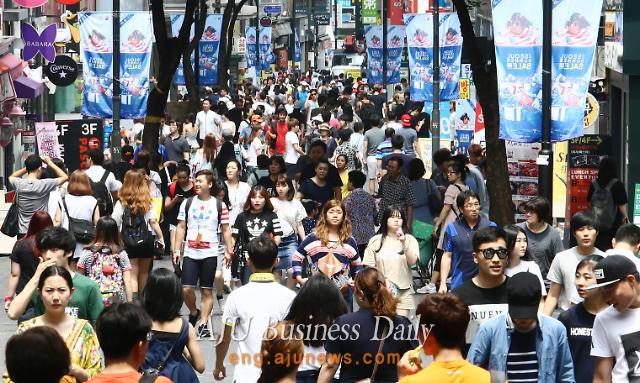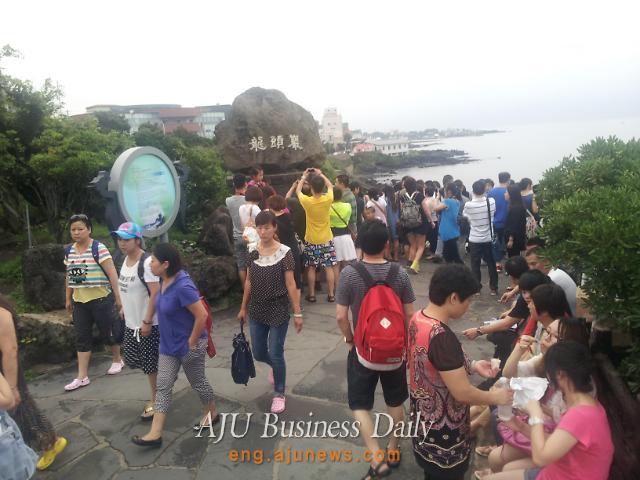
Myungdong, the center of Seoul, is a famous tourist spot [Photo by Namkung Jin-woong = timeid@]
[FOCUS: New code of conduct for Chinese tourists travelling abroad]
Chinese tourists visiting South Korea and other countries are received well for their spending spree, but an indecent and scandalous scene caused by some ill-mannered travelers has often been frowned upon, prompting Beijing to cram their head with a code of behavior at home and abroad.
With a new doctrine called "civilized tourists, plus points for the Chinese", Beijing launched a rare campaign last week, urging its citizens to behave properly while traveling.
The event at Beijing's Summer Palace was organized by the Chinese National Tourism Administration, which has been swamped with shameful reports from abroad about Chinese tourists.
The administration board called for the regular education of travel manner on a quarterly basis, while Xu Zhijun, deputy secretary general of the Beijing city government, was called out to say that Chinese tourists should be mindful of their action and words and keep the image of their homeland in mind.

Myungdong streets are filled with advertisements to attract Chinese customers [Photo by Yoo Dae-gil = dbeorlf123@]
Official Chinese data showed more than 120 million Chinese tourists went overseas in 2015, including six million visitors to South Korea. Their favorite sites are Thailand, Japan, and the United States. There were no updated figures, but Chinese tourists spent $165 billion overseas in 2014.
Analysts in Seoul were generally pessimistic about the short-term effect of the Chinese code of conduct, saying a behavioral change requires a long period of education as South Korea did in the 1980s and 1990s.
"It's a mere matter of knowing and not knowing about international manners. I believe China's educational campaign will make things better," Kim Jong-in, an official at Incheon International Airport, South Korea's main gateway west of Seoul, told Aju News. "They are just not familiar with public manner. That's all."
One typical case of Chinese misbehavior was aired by a Japanese TV station. During a spring cherry blossom festival in Osaka, some Chinese tourists were seen climbing the trees to take pictures, ending up in damaging the trees.
In other parts of the world, similar scenes have been reported, with locals blaming them for being insensitive and bad-mannered. In Thailand last year when a band of Chinese tourists crashed a hotel buffet by clearing all food off the table in a minute.
In September last year, a Chinese tourist was stopped by immigration officials at Los Angeles International Airport for his previous "uncivilized" behavior. His 10-year visa was canceled on the spot and sent home.

Chinese tourists in Jeju Island[Photo by Jin Sun-hyun]
South Korea charged 423 Chinese tourists with misdemeanors in 2004. South Korean police data found that 98 percent of crimes committed by foreign tourists involved Chinese.
"I think it will be very hard for the Chinese tourists to change. It's a matter of cultural differences, Park Joong-hong, a patent attorney in Myungdong in central Seoul which has been crowded with Chinese tourists.
Smoking and littering in public places and toilets are seen frequently in the shopping district, Park said, adding some Chinese tourists do not care or appear to be ignorant. "There are signs and boards saying Myungdong is a non-smoking zone. But I see Chinese tourists smoking everywhere and throwing away garbage."
Park, however, said he was trying to understand about their behavior. "I know that smoking is considered as a social behavior in China. It is not as much hated by the people as it is in Korea," he said.
아주경제 박세진 기자 = swatchsjp@ajunews.com

